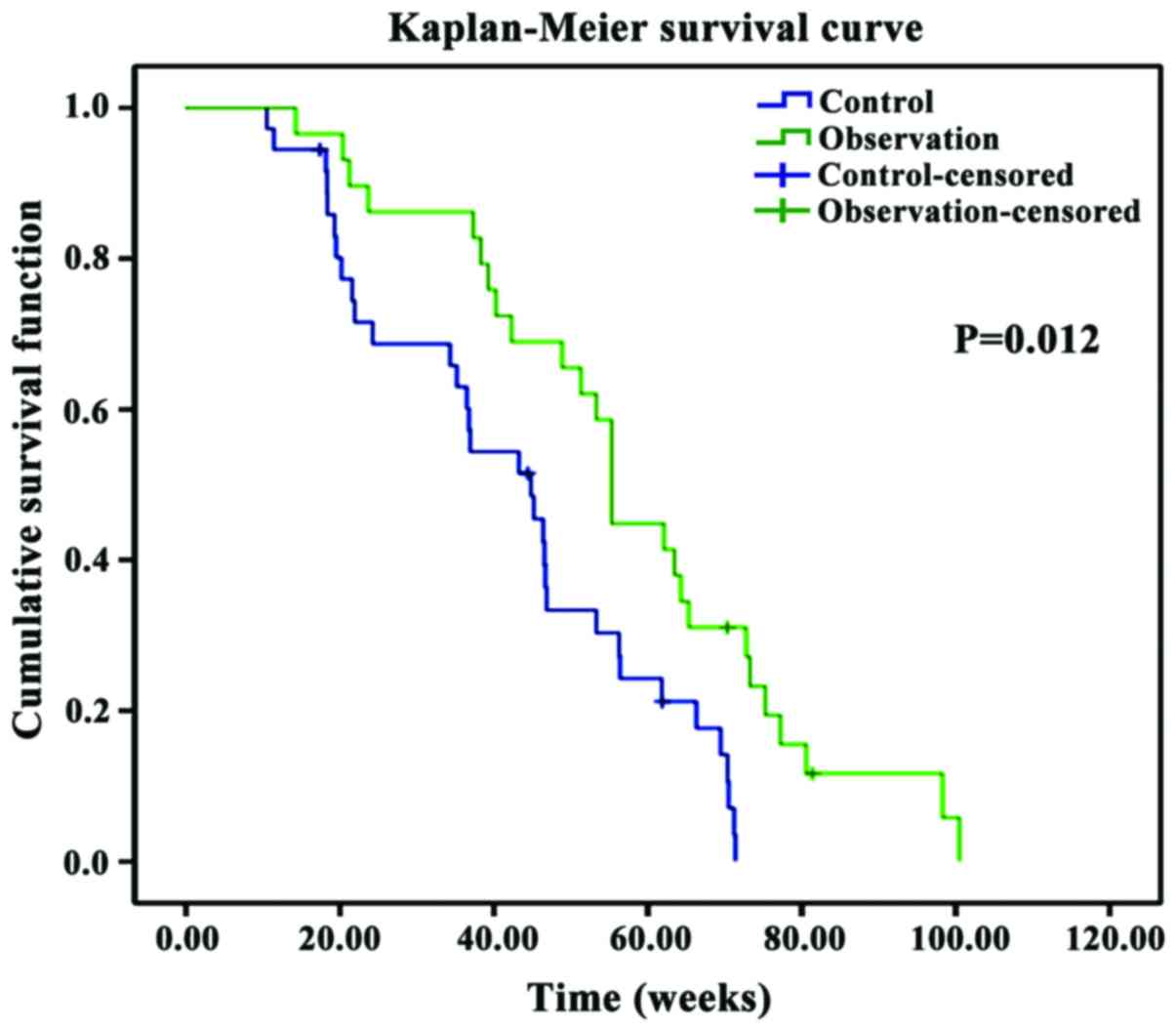|
1
|
Lu HC, Ma J, Zhuang Z, Qiu F, Cheng HL and
Shi JX: Exploring the regulatory role of isocitrate dehydrogenase
mutant protein on glioma stem cell proliferation. Eur Rev Med
Pharmacol Sci. 20:3378–3384. 2016.PubMed/NCBI
|
|
2
|
Eckel-Passow JE, Lachance DH, Molinaro AM,
Walsh KM, Decker PA, Sicotte H, Pekmezci M, Rice T, Kosel ML,
Smirnov IV, et al: Glioma Groups based on 1p/19q, IDH, and TERT
promoter mutations in tumors. N Engl J Med. 372:2499–2508. 2015.
View Article : Google Scholar : PubMed/NCBI
|
|
3
|
Sakai K, Shimodaira S, Maejima S, Udagawa
N, Sano K, Higuchi Y, Koya T, Ochiai T, Koide M, Uehara S, et al:
Dendritic cell-based immunotherapy targeting Wilms' tumor 1 in
patients with recurrent malignant glioma. J Neurosurg. 123:989–997.
2015. View Article : Google Scholar : PubMed/NCBI
|
|
4
|
Munck AF, Rosenschold P, Costa J,
Engelholm SA, Lundemann MJ, Law I, Ohlhues L and Engelholm S:
Impact of [18F]-fluoro-ethyl-tyrosine PET imaging on target
definition for radiation therapy of high-grade glioma. Neuro Oncol.
17:757–763. 2015. View Article : Google Scholar : PubMed/NCBI
|
|
5
|
Laack NN, Sarkaria JN and Buckner JC:
Radiation therapy oncology group (RTOG) 98–02: Controversy or
consensus in the treatment of newly diagnosed low grade glioma
(LGG). Semin Radiat Oncol. 25:197–202. 2015. View Article : Google Scholar : PubMed/NCBI
|
|
6
|
Zhang Y, Guo F, Zhang WL, Huang DS, Hong L
and Han T: Clinical application of 125I particle
implantation in children with rhabdomysarcoma of the head and neck.
Zhongguo Dang Dai Er Ke Za Zhi. 14:437–440. 2012.(In Chinese).
PubMed/NCBI
|
|
7
|
van Zweeden AA, van der Vliet HJ, Wilmink
JW, Meijerink MR, Meijer OW, Bruynzeel AM, van Tienhoven G,
Giovannetti E, Kazemier G, Jacobs MA, et al: Phase I clinical trial
to determine the feasibility and maximum tolerated dose of
panitumumab to standard gemcitabine-based chemoradiation in locally
advanced pancreatic cancer. Clin Cancer Res. 21:4569–4575. 2015.
View Article : Google Scholar : PubMed/NCBI
|
|
8
|
Chambless LB, Kistka HM, Parker SL,
Hassam-Malani L, McGirt MJ and Thompson RC: The relative value of
postoperative versus preoperative Karnofsky Performance Scale
scores as a predictor of survival after surgical resection of
glioblastoma multiforme. J Neurooncol. 121:359–364. 2015.
View Article : Google Scholar : PubMed/NCBI
|
|
9
|
Cohen AL and Colman H: Glioma biology and
molecular markers. Cancer Treat Res. 163:15–30. 2015. View Article : Google Scholar : PubMed/NCBI
|
|
10
|
Paw I, Carpenter RC, Watabe K, Debinski W
and Lo HW: Mechanisms regulating glioma invasion. Cancer Lett.
362:1–7. 2015. View Article : Google Scholar : PubMed/NCBI
|
|
11
|
Pang C, Guan Y, Zhao K, Chen L, Bao Y, Cui
R, Li G and Wang Y: Up-regulation of microRNA-15b correlates with
unfavorable prognosis and malignant progression of human glioma.
Int J Clin Exp Pathol. 8:4943–4952. 2015.PubMed/NCBI
|
|
12
|
Ceccarelli M, Barthel FP, Malta TM,
Sabedot TS, Salama SR, Murray BA, Morozova O, Newton Y, Radenbaugh
A, Pagnotta SM, et al: TCGA Research Network: Molecular profiling
reveals biologically discrete subsets and pathways of progression
in diffuse glioma. Cell. 164:550–563. 2016. View Article : Google Scholar : PubMed/NCBI
|
|
13
|
Ma KX, Wang HJ, Li XR, Li T, Su G, Yang P
and Wu JW: Long noncoding RNA MALAT1 associates with the malignant
status and poor prognosis in glioma. Tumour Biol. 36:3355–3359.
2015. View Article : Google Scholar : PubMed/NCBI
|
|
14
|
Rizzo AE and Yu JS: Radiation therapy for
glioma stem cells. Adv Exp Med Biol. 853:85–110. 2015. View Article : Google Scholar : PubMed/NCBI
|
|
15
|
McTyre E, Lucas JT, Helis C, Farris M,
Soike M, Mott R, Laxton AW, Tatter SB, Lesser GJ, Strowd RE, et al:
Outcomes for anaplastic glioma treated with radiation therapy with
or without concurrent temozolomide. Am J Clin Oncol. Mar
15–2017.(Epub ahead of print). doi: 10.1097/COC.0000000000000380.
View Article : Google Scholar : PubMed/NCBI
|
|
16
|
Dyk PT, Richardson S, Badiyan SN, Schwarz
JK, Esthappan J, Garcia-Ramirez JL and Grigsby PW: Outpatient-based
high-dose-rate interstitial brachytherapy for gynecologic
malignancies. Brachytherapy. 14:231–237. 2015. View Article : Google Scholar : PubMed/NCBI
|
|
17
|
Denecke T, Stelter L, Schnapauff D,
Steffen I, Sinn B, Schott E, Seidensticker R, Puhl G, Gebauer B,
Hänninen EL, et al: CT-guided interstitial brachytherapy of
hepatocellular carcinoma before liver transplantation: An
equivalent alternative to transarterial chemoembolization? Eur
Radiol. 25:2608–2616. 2015. View Article : Google Scholar : PubMed/NCBI
|
|
18
|
Zhao X, Bai HX, Zou Y and Yang L: Letter:
Reoperation for recurrent high-grade glioma: Does tumor genetics
play a role? Neurosurgery. 76:E496–E497. 2015. View Article : Google Scholar : PubMed/NCBI
|
|
19
|
Shi S, Yang J and Sun D: CT-guided
125I brachytherapy on pulmonary metastases after
resection of colorectal cancer: A report of six cases. Oncol Lett.
9:375–380. 2015.PubMed/NCBI
|
|
20
|
Li G, Zhang Z, Tu Y, Jin T, Liang H, Cui
G, He S and Gao G: Correlation of microRNA-372 upregulation with
poor prognosis in human glioma. Diagn Pathol. 8:1–6. 2013.
View Article : Google Scholar : PubMed/NCBI
|















